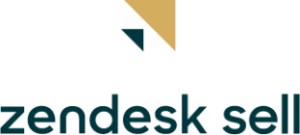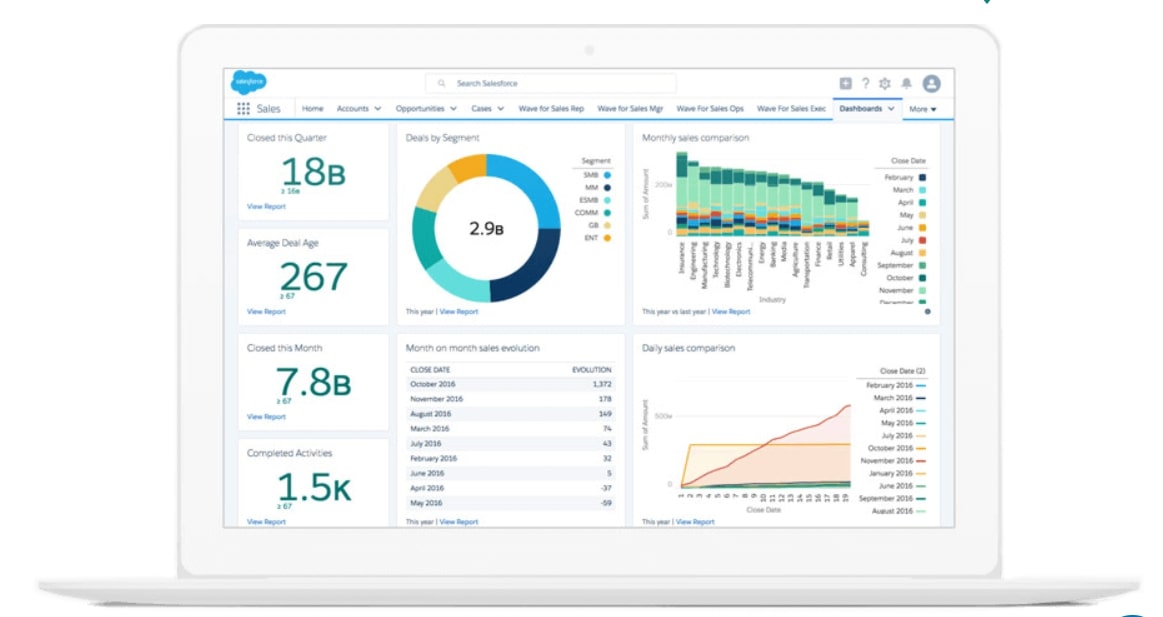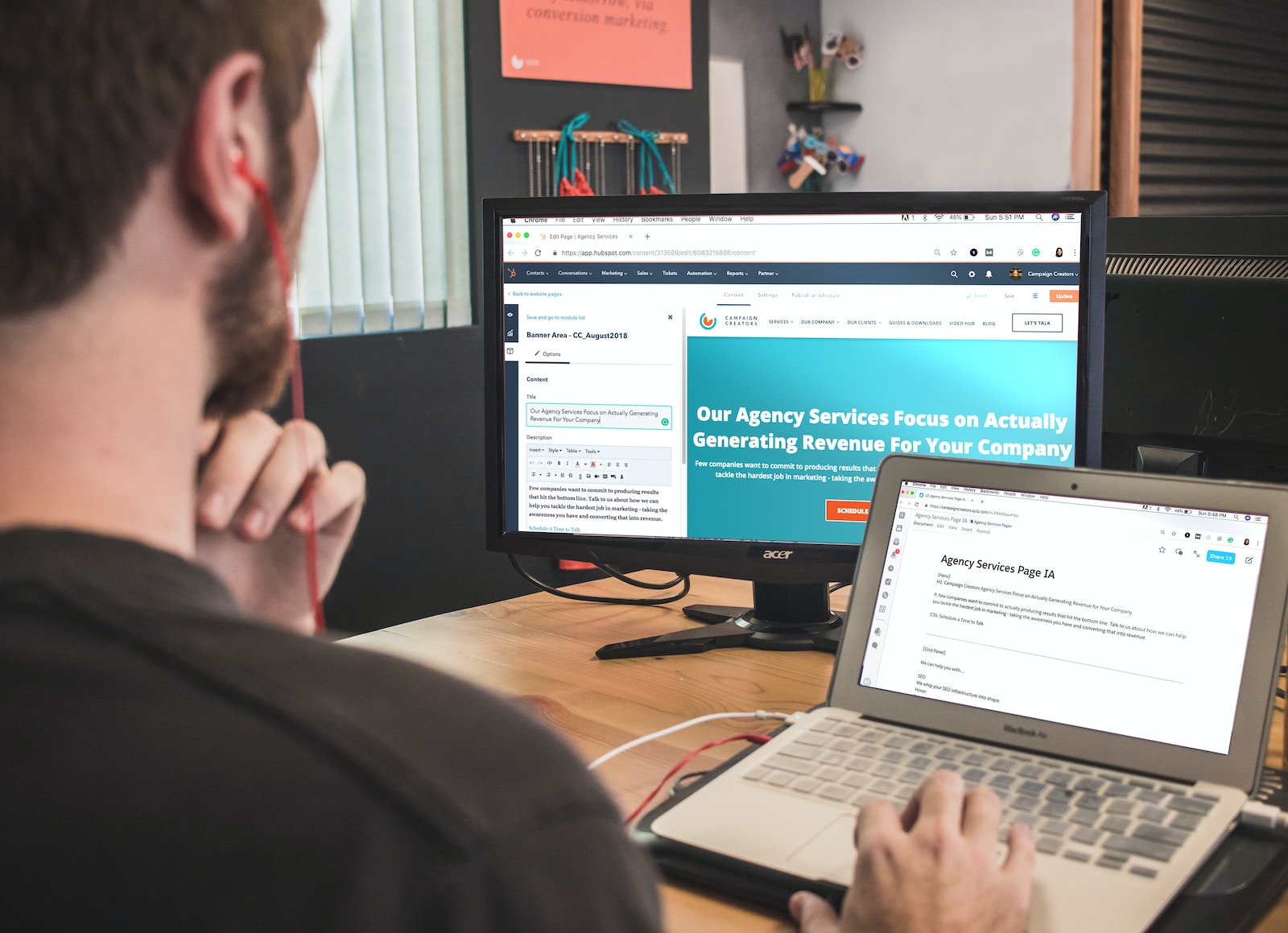Salesforce and Zoho CRM are the world’s most popular customer relationship management (CRM) software applications. They can manage customer data, process sales and marketing interactions, create reports, and more.
Both tools offer similar features and have an intuitive user interface that makes it easy to use them for businesses of all sizes. However, some important differences between these two tools are important to consider when choosing a CRM system for your business.
This article will compare Zoho CRM and Salesforce, including their main features, price, customer support, and other key information to help you decide which product is better for your company.
We will also look at each tool’s strengths and weaknesses to help you decide which one is the best fit for your business.
Zoho vs Salesforce: Similarities
- Both Zoho and Salesforce offer a vast array of products besides their CRM tools.
- Both Zoho CRM and Salesforce have excellent integration capabilities.
- Both Zoho and Salesforce cover excellent reports and analytics.
- Both Zoho CRM and Salesforce are highly customizable.
Zoho vs Salesforce: Differences
- Zoho is better suited for small businesses, whereas Salesforce is more appealing to medium and large organizations.
- Zoho includes a free version, whereas Salesforce does not.
- Salesforce is significantly more expensive than Zoho.
- The setup process is quicker with Salesforce.
What is Zoho CRM?
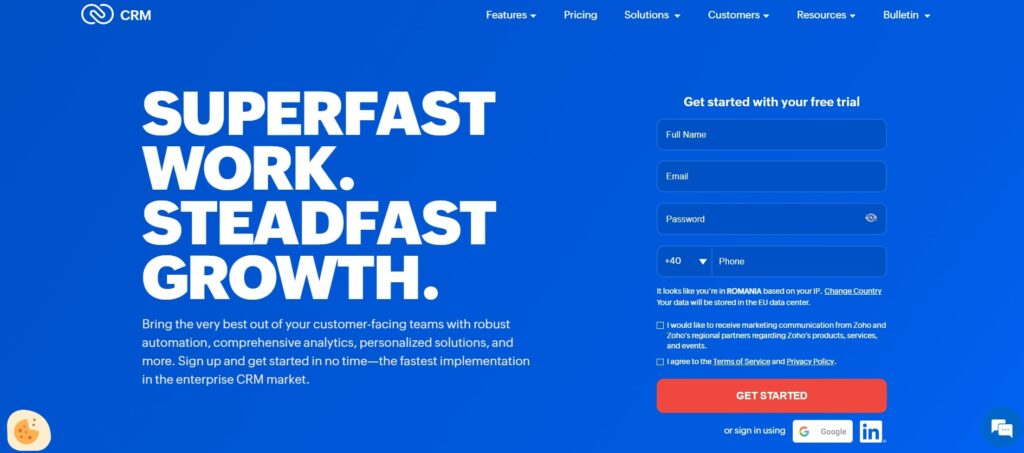
Zoho CRM is a comprehensive CRM software solution that caters to small businesses. With prices starting from $14/user/month (annual billing), Zoho CRM offers excellent value for money, considering its capabilities.
The platform includes a broad list of customization options, integrations, and advanced features that would otherwise be available in more expensive CRM platforms.
Zoho CRM Key Features
- Integration with Google Ads and social media platforms
- Sales and marketing automation
- Scoring and assignment rules
- Contact management
- Sales forecasting
What is Salesforce?
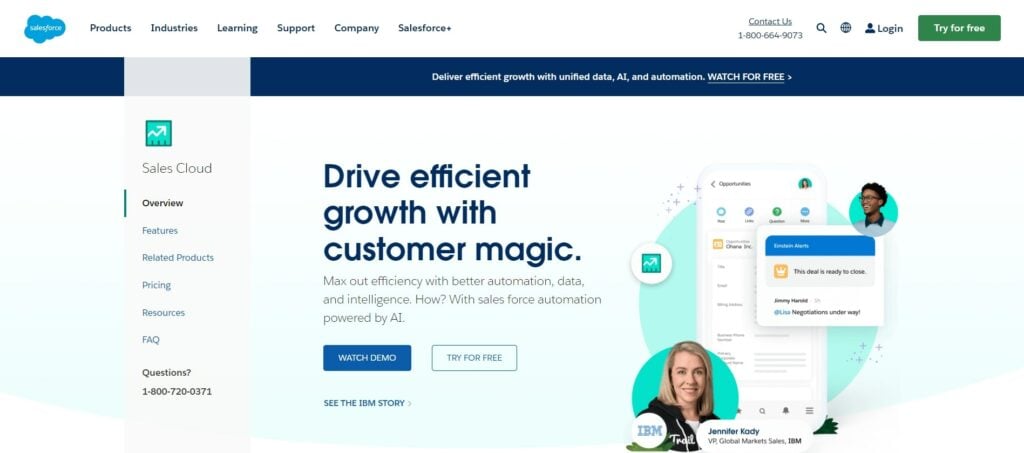
Over two decades of experience, Salesforce has grown to cover multiple products besides its CRM software solution. More specifically, the platform also offers products for marketing, customer support, eCommerce, and more.
However, Salesforce Sales Cloud, the platform’s dedicated CRM tool, remains one of Salesforce’s most popular products. That’s because it’s highly customizable, offers a wide range of advanced features and reports, and it’s rather easy to use considering the platform’s complexity.
Salesforce Key Features
- Collaborative and predictive forecasting
- Opportunity and lead scoring
- Configure, Price, Quote (CPQ)
- Built-in customer service tools
- Contact management
Zoho vs Salesforce: CRM Features
Reports and Analytics
Zoho CRM
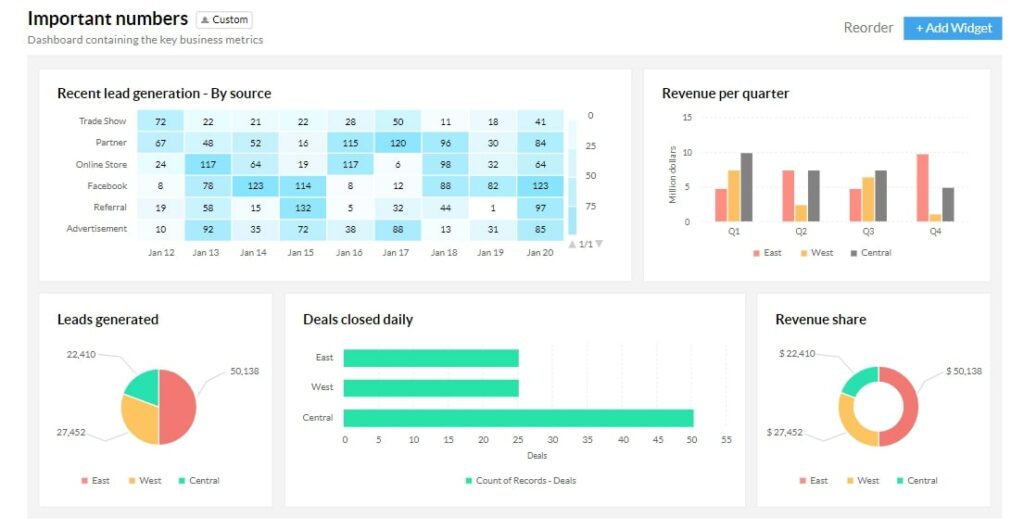
In short, Zoho offers highly advanced reporting features and analytics capabilities, especially considering the platform’s pricing.
For one, the platform allows you to create and schedule customized reports in all pricing packages, except the free version. Zoho allows you to merge multiple reports into one to help you gather easier-to-digest information across your organization. You can then easily visualize these reports by converting them into tables, pie, columns, line charts, and much more.
Secondly, Zoho brings some unique features. There’s the Anomaly Detector, for instance. This feature analyzes your sales pipelines to identify and notify you of any abnormal behavior, like a sudden decrease or increase in conversions, page views, etc. That said, you’ll get to quickly capitalize on positive sales trends or address any issues before they aggravate.
Lastly, there’s the diversity of pre-built reports Zoho offers. If you don’t wish to spend time in customization, Zoho gives you access to 0ver 40 ready-made report templates covering sales performance, revenue, deals closed/month, and much more.
Other features include cohort and quadrant analysis, report sharing, web form analytics, etc.
Salesforce
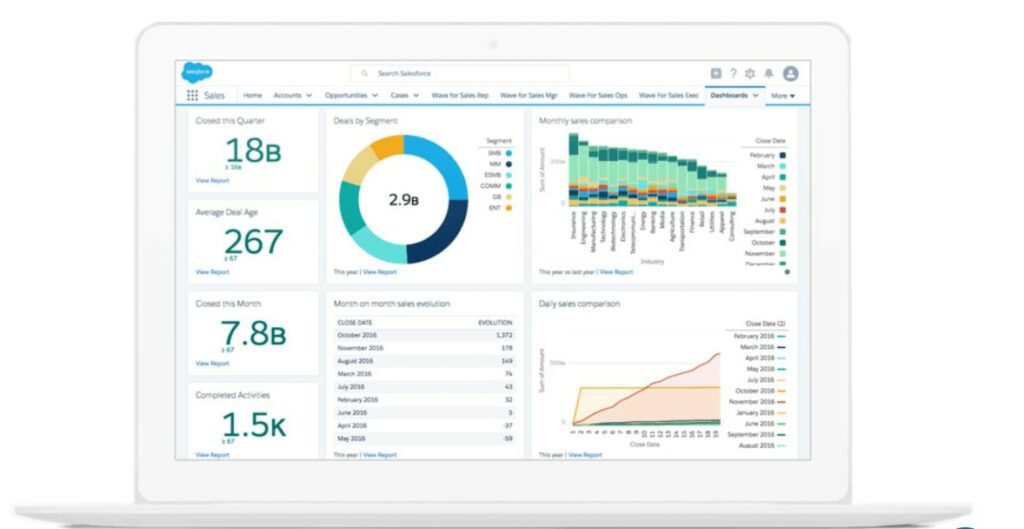
Salesforce also offers customizable reports across all of its pricing plans. Moreover, high-tier pricing plans allow you to merge multiple reports, add cross-filters, and handle history tracking for more comprehensive insights regarding your sales operations.
The Pipeline Inspection functionality also leverages AI technology to deliver insights about your sales pipeline’s overall health and performance. Sales agents can use this feature to gather a coherent overview regarding pipeline opportunities, deal stages, deal close date projections, weekly changes, and more.
Additionally, the Einstein Analytics tool is an optional add-on to the Sales Cloud that costs $50/user/month (annual billing). This functionality uses AI to analyze conversations and past sales performance. It then uses that information to deliver real-time suggestions and insights on boosting sales.
For instance, Einstein Analytics can deliver accurate sales forecasts with explanations that back up these predictions through Machine Learning and AI technology. Moreover, this tool can also examine opportunity, sales engagement, and other factors to help sales agents identify and capitalize on essential business developments.
Customization Options
Zoho CRM

In short, Zoho is a highly customizable CRM software solution. Aside from creating custom reports, you can also visualize Zoho reports through pie, line, and column charts, for instance. Consequently, getting an easy-to-digest view of your reports shouldn’t be a problem.
Moreover, Zoho enables users to customize page layouts for every process step. Each page layout can include custom buttons, links, fields, showcase personalized data, and more.
Additionally, the page layouts can easily be linked, allowing sales representatives to quickly gather all the necessary information connected to a deal or marketing campaign. For instance, you can link leads with campaigns, accounts with contacts, or go the other way around.
Other customization options include the ability to create bespoke views based on your industry via Zoho Canvas, translate multiple languages for localized sales, select between multiple currencies, and much more.
Salesforce

Salesforce offers in-depth customization options as well. Aside from creating custom reports or dashboards, Salesforce allows you to modify nearly every platform element. For instance, you can customize Salesforce’s interface by tweaking its colors and logos to reflect your corporate identity better.
You can also customize user profile roles and page layouts. As such, you can easily control which users can see which form fields within a given record. Other than that, Salesforce allows you to set up customized sales processes, form fields, automation rules, and more.
That’s not enough, though. The platform also allows you to create custom features, extending the CRM software solution’s usability considerably. However, building custom functionalities in Salesforce requires much technical knowledge and possibly a dedicated development team.
Automation Tools
Zoho CRM

Zoho offers excellent automation tools, both in terms of marketing and sales. For one, Zoho facilitates email marketing with the ability to set up and schedule bulk email marketing campaigns.
You can also set up autoresponders and get access to various email templates depending on your selected Zoho pricing plan.
The platform handles sales forecasting and allows you to set up scoring rules or web-to-lead capture forms to help identify and track high-value leads via the platform’s sales force automation tools.
Zoho also excels in its workflow automation tools. More specifically, the platform allows you to set up custom workflow rules, automate and manage tasks, set up user permissions, and more.
Another handy feature is duplicate merging, which automatically merges duplicated CRM data to improve data organization and eliminate the risk of causing potential confusion. This functionality can also be found in Salesforce.
Salesforce

The same story goes with Salesforce. The platform’s marketing automation tools allow you to send emails in mass and set up lead-to-capture forms. Additionally, the platform includes lead and opportunity scoring to help you prioritize the best leads and deals accordingly.
Furthermore, the platform covers workflow and approval automation tools that help you automate tasks, email notifications, field updates, etc. You can easily automate your sales process through Sales Cloud Process Builder, which features an intuitive interface.
Communication Tools
Zoho CRM
Zoho provides all the necessary tools to help you keep in touch with your leads and team members. As mentioned, the platform covers various email marketing tools.
However, you can also integrate Zoho with your Facebook and Twitter social media accounts. This feature helps you monitor your social media activities and engage with customers within the platform to help you improve customer relationships.
Regarding team collaboration, the platform includes feeds, a built-in chat, notes, the ability to set up tags and groups, etc. In other words, Zoho’s team collaboration tools should be enough to help you keep your team updated in real-time and better organize team members by creating multiple groups and tags.
Salesforce
The Sales Cloud offers 2-way synching with Gmail and Outlook, allowing you to send and receive emails directly within the platform.
However, Salesforce lacks Zoho’s social media integration capabilities. Still, the Sales Cloud can help you manage and monitor marketing campaigns across multiple channels, which may make up for the lack of social media communication tools. Other communication tools include built-in chat and file sharing.
There’s also the Inbox functionality. In short, this feature integrates with your email and calendar apps to help you schedule meetings and send personalized emails by bringing up all the necessary lead data.
Verdict: Both win in Features
Overall, when comparing Zoho to Salesforce, it turns out that both CRM solutions offer an excellent suite of features. That doesn’t mean they’re similar, though. Although both CRM systems excel in automation tools, Zoho and Salesforce slightly differ in other categories.
More specifically, Salesforce offers more advanced analytics and customization capabilities, while Zoho is more versatile in communication tools. That said, the winner here comes down to your business needs.
Salesforce vs Zoho CRM: Ease of Use
Zoho CRM

Zoho CRM is relatively easy to use in entry-level pricing plans. The platform doesn’t include as many advanced features, making it easy to navigate. However, as you gradually scale to up-tier packages, you’ll find that Zoho gets increasingly harder to use.
The platform’s UI doesn’t do a good job of displaying all the features intuitively. As such, Zoho can get a little cumbersome and overwhelming, especially for new users.
Regarding the setup process, you can easily import data to the platform through the Zoho import wizard, making the implementation process relatively quick.
Salesforce

Since this CRM software solution is also a complex system, it suffers from the same issue as Zoho. The platform’s interface isn’t up to par with its broad features, making it slightly difficult to navigate.
However, Salesforce makes up for it through its easy customization. You can seamlessly tweak multiple platform aspects via a straightforward drag-and-drop interface, including automated workflows. As for the setup process, Salesforce may take a little longer. That’s because of the platform’s vast selection of customization options.
You’ll also need to consider the broader advanced functionalities in lower-tier pricing plans, as newcomers may need a little more time to learn them properly.
Zoho is Easier to Use
Generally speaking, Zoho is slightly easier to use, especially if you opt for lower-tier pricing plans. These packages don’t include as many advanced functionalities that might clutter the platform’s interface, while the setup process is rather quick. However, more advanced users may still prefer Salesforce due to the platform’s customization capabilities.
Zoho CRM vs Salesforce CRM: Integrations
Zoho CRM
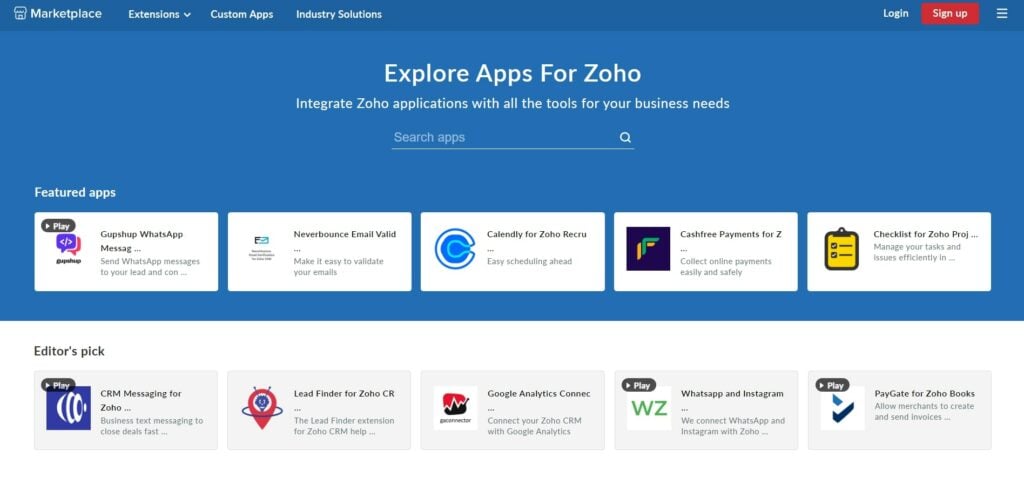
The CRM integrates natively with Zoho’s 10+ products. These include software solutions dedicated to marketing, customer support, project management, HR management, etc.
Moreover, there’s the Zoho Marketplace, where you can integrate any Zoho products with 1000+ other business apps. CRM integrations range from inventory management and analytics tools to telephony and collaboration systems. Not to mention that you integrate Zoho with Zapier to get access to even more third-party apps.
Salesforce
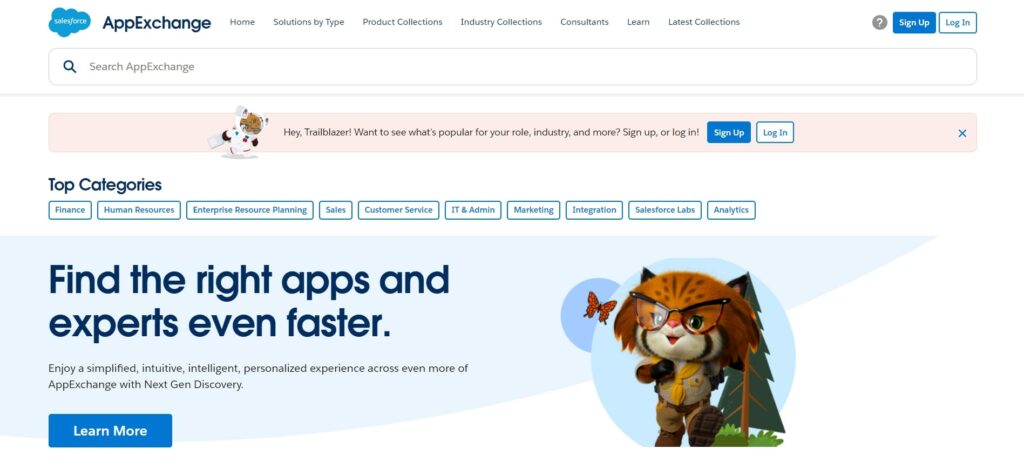
Like Zoho, the Sales Cloud integrates natively with other Salesforce products, including the Marketing Cloud, Customer Service Cloud, Commerce Cloud, and more. However, the Salesforce AppExchange includes more integrations than Zoho Marketplace.
More specifically, the AppExchange gives you access to 3000+ business applications. You also have the option to use Zapier for access to more third-party apps.
Salesforce wins in Integrations
Although the two CRM platforms offer an excellent variety of integrated apps and access to Zapier for third-party integrations, Salesforce leads in the integrations department due to its larger number of apps found in the AppExchange.
Zoho vs Salesforce CRM: Pricing
Zoho CRM

- Free (up to three users): Use up to ten custom email templates, duplicate data merging, workflow automation rules, lead management, and other basic sales tools.
- Standard – $14/user/month (annually): Access 100 email templates, scoring rules, customizable reports, sales forecasting, etc.
- Professional – $23/user/month (annually): Use unlimited email templates, SalesSignals, inventory management, etc.
- Enterprise – $40/user/month (annually): Access the Anomaly Detector, create autoresponders, schedule emails in bulk, and more.
- Ultimate – $52/user/month (annually): Get access to the platform’s features, including A/B tests for 10 web forms/modules, 20 custom schedules, 5GB of file storage, etc.
There’s also a 15-day free trial available for all pricing plans.
Salesforce
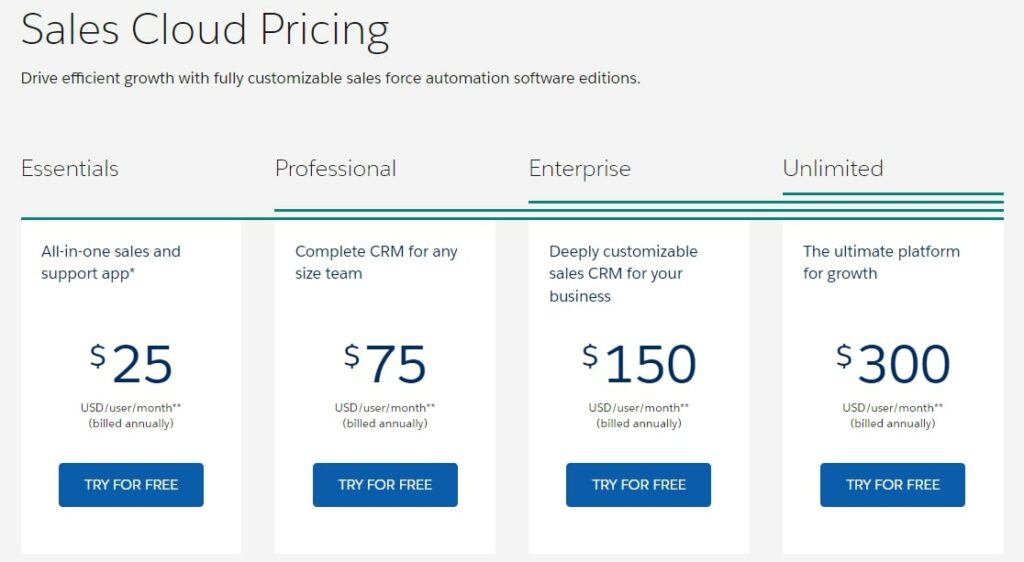
- Essentials – $25/user/month (annually): Get access to the Salesforce mobile app, contact management, lead management, task management, and more.
- Professional – $75/user/month (annually): Unlock CPQ, collaborative forecasting, lead registration, pipeline/forecast management, and more.
- Enterprise – $150/user/month (annually): Access workflow and approval automation tools, opportunity splits and scoring, etc.
- Unlimited – $300/user/month (annually): Unlock lead scoring, conversation insights, predictive forecasting, and more.
There’s also a 14-day free trial available for all pricing plans.
Zoho wins in Pricing
Zoho pricing plans are much better catered to small businesses. Salesforce pricing plans are significantly more expensive than Zoho across the board. Not to mention that Zoho also includes a free CRM. Also, note that Enterprise customers with over 20 licenses can unlock Zoho Zia, the platform’s AI-powered sales assistant.
Salesforce vs Zoho: Customer Support
Zoho CRM

Free users get access to the platform’s online resources. Meanwhile, paid users also benefit from email/chat/phone support. However, one of the main drawbacks is that customer support is put behind various paywalls.
For instance, if you’d like access to 24/5 customer support and faster response time, you’ll need to opt for the separate Premium support plan, which costs %20 of your subscription fee.
If you have over 25 user licenses, you can opt for the Enterprise plan for support, which costs %25 of your subscription fee. This grants 24/7 customer support, a dedicated technical account manager, and up to 1-hour response time.
As such, standard customer support tends to be neglected. Most users report that support is usually slow to respond.
Salesforce
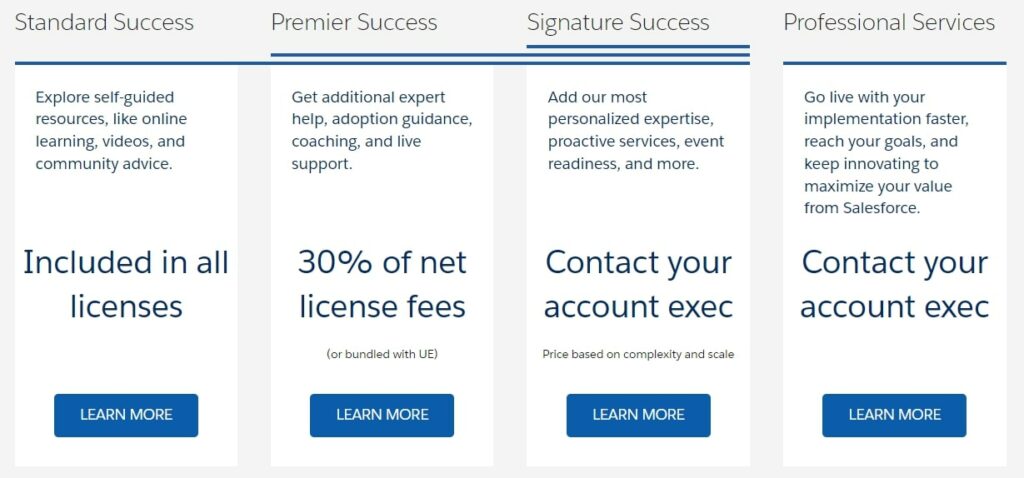
The same story goes with Salesforce. The platform offers access to the Trailblazer Community, a self-serve knowledge base, and basic tech support as standard. Meanwhile, 24/7 support and other benefits, like configuration services, are hidden behind extra paywalls.
As for user reviews, users have mixed feelings. Some say that support is slow and not helpful, while others report receiving prompt responses and useful information.
Salesforce wins in Customer Support
Although both tools could use some work in the customer service department, Salesforce is slightly better. Users generally seem happier, while 24/7 customer support is accessible for most customers – even though it’s a paid add-on.
In contrast, Zoho’s 24/7 support is only available for 25 user licenses and up.
Salesforce vs Zoho: Pros and Cons
Now that we’ve covered both CRMs in detail. Let’s summarize with a quick list of the pros and cons of each platform.
Salesforce Pros
- Broad set of advanced functionalities
- In-depth customization options
- Excellent integration features
- Great reports and analytics
Salesforce Cons
- Lead scoring only available in the Ultimate plan
- May be overwhelming for newcomers
- Steep pricing between packages
Zoho CRM Pros
- Excellent set of team and customer communication tools
- Broad set of advanced functionalities
- Free version included
- Affordable
Zoho CRM Cons
- Can get tricky to use once you scale up in pricing plans
- Customer support is put behind various paywalls
Zoho CRM vs Salesforce: Conclusion
And there you have it – an in-depth comparison of Zoho CRM and Salesforce. Although both customer relationship management platforms are excellent in terms of their features, they are built for different purposes. When comparing Zoho to Salesforce pricing, the former is much better suited for a small business owner.
Zoho‘s pricing plans are more affordable, and a free version is available. Meanwhile, Salesforce‘s vast customization and integration options make the platform an excellent choice for users seeking more versatility. However, considering the platform’s pricing, Salesforce offers better value for money for medium to large organizations.





